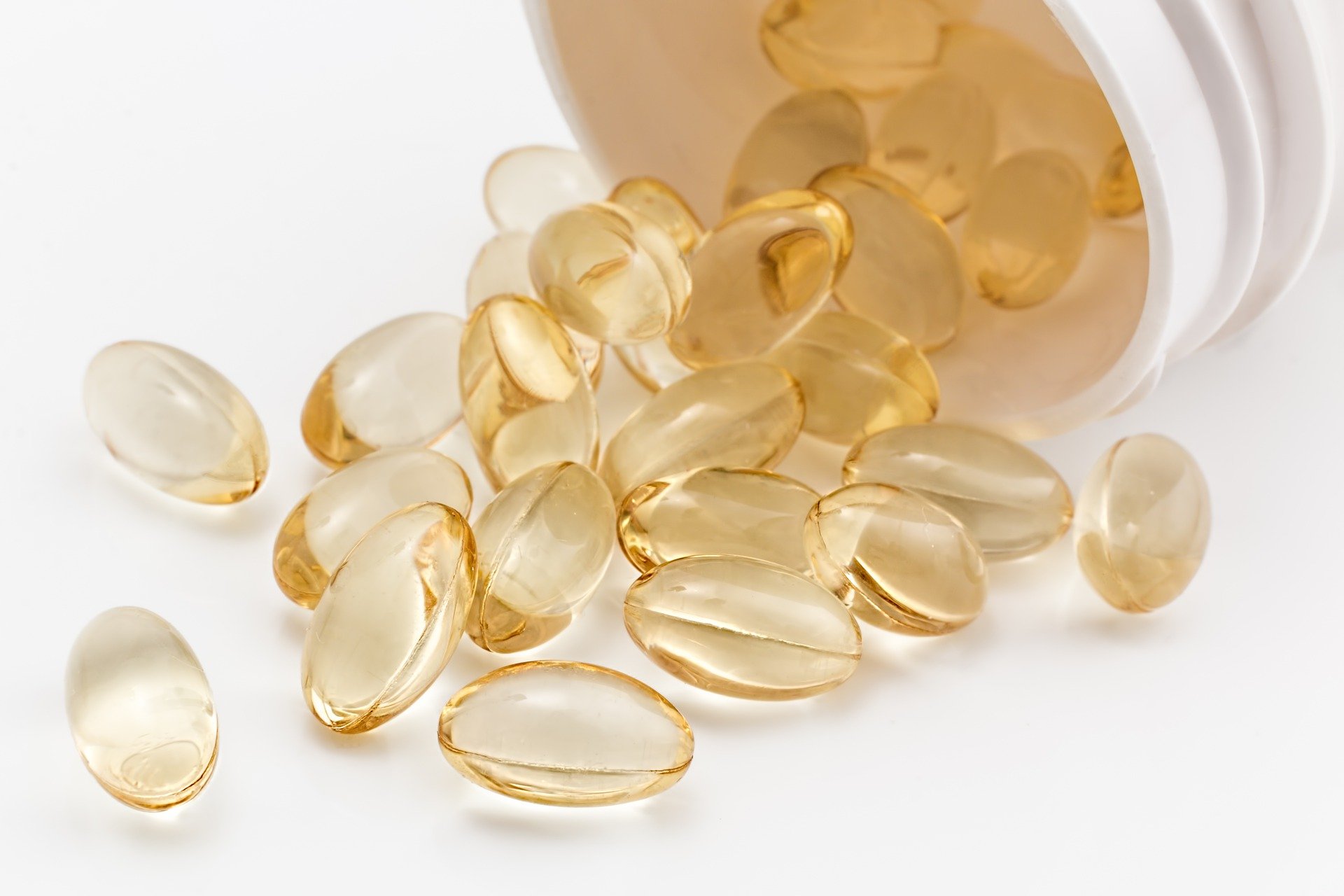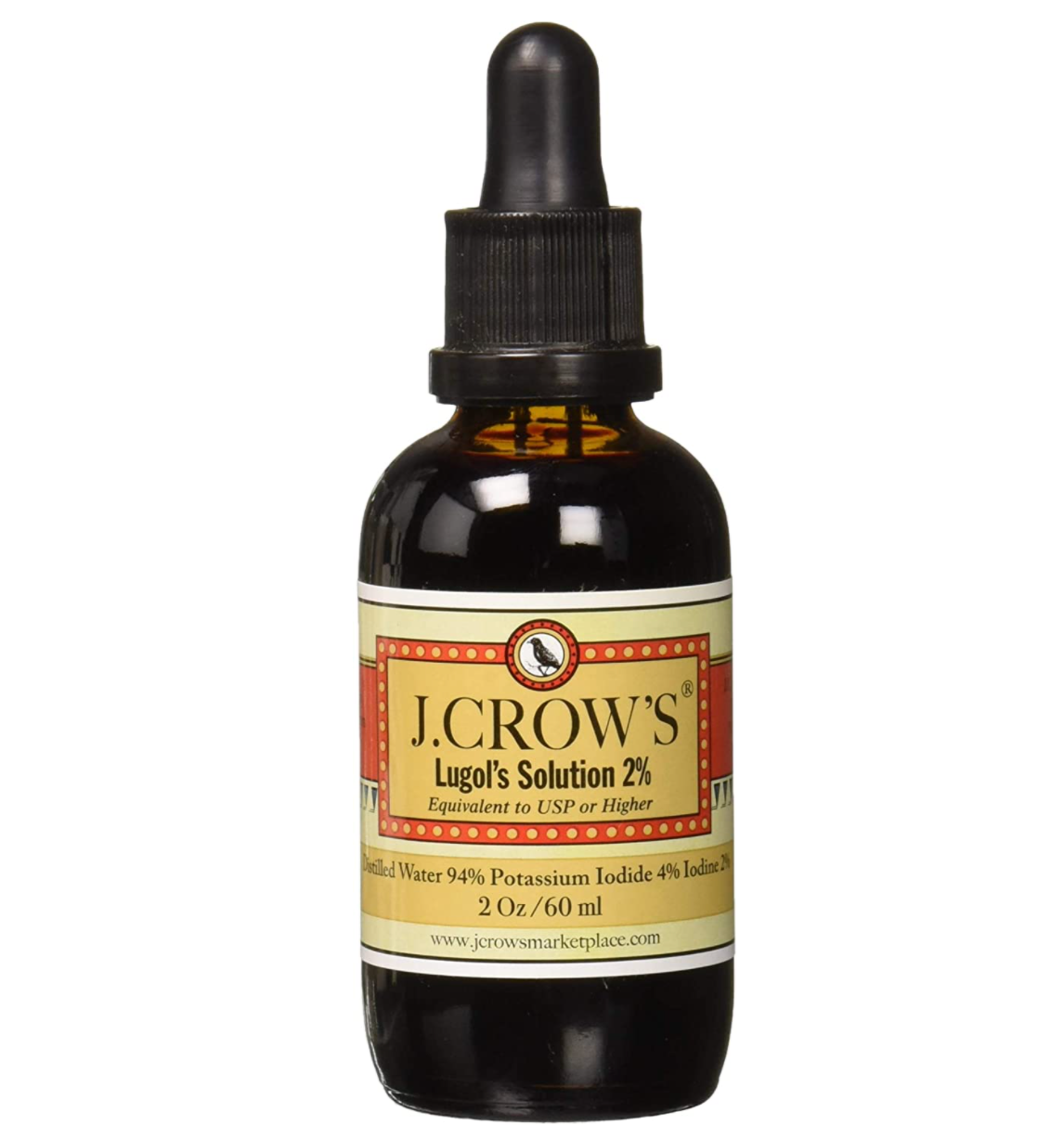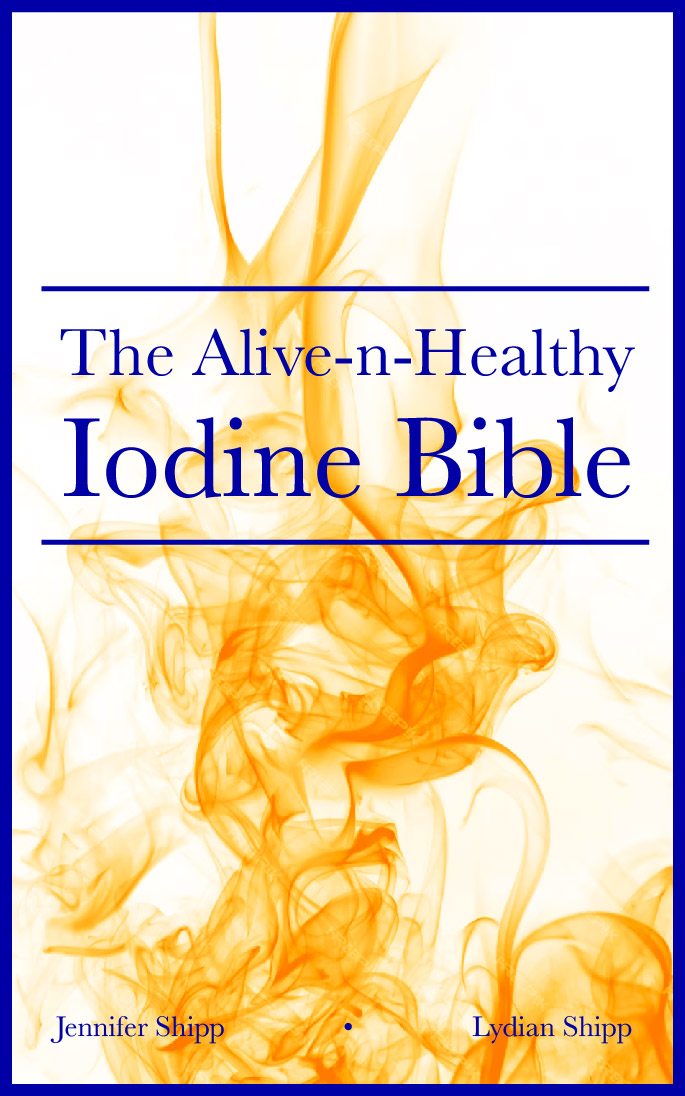
Iodine as an Alternative Treatment for Parkinson's and Lewy Body Dementia
Taking iodine supplements literally changed my life. It changed my daughter's life. And it changed my husband's life. Later, it changed my parent's lives. I tell everyone about iodine supplementation because every single American is deficient in iodine. I explain why this is true below and I go into even more depth in an article I wrote about iodine supplementation as a cure for breast cancer. I tell everyone about iodine because I once had fibrocystic breast syndrome. This went away over the course of about a year of taking high dose iodine supplements. I once suffered from foggy headedness, low energy levels, difficulty losing weight, cystitis, fatigue, susceptibility to infection, and more. But I don't have these problems anymore because I take my daily dose of iodine religiously. Lydian was once diagnosed with asthma, but her asthma abruptly went away when we started administering iodine. My husband had melanoma, but the melanoma went away when he started administering Lugol's iodine (along with vitamin B17 and high pH therapy).You may be inclined to think that something as simple as iodine deficiency couldn’t possibly cause a disease as dramatic as Parkinson's or Lewy Body Dementia, but at least entertain the possibility that it could be a contributing factor in these diseases as you read this article. Especially note the fact that Lugol's iodine is a natural heavy metal chelator. Exposure to heavy metals like mercury have been implicated as a major root cause of different neurological disorders including Alzheimer's and other forms of dementia. But one could also say that a major reason why heavy metal exposure is so toxic is because Americans and citizens of other developed countries are deficient in Iodine. So, if you buy into the idea that heavy metal exposure might be a driving cause behind the epidemic of dementia and other neurological disorders in developed countries, consider also the fact that iodine, an essential nutrient, is deficient in soils due to industrialized farming practices--which means that it is deficient in foods.
Bromine toxicity compounds the problem of iodine, and unfortunately, a lot of people are tempted to stop taking their Lugol's iodine when they begin going through the bromine detoxification process which usually takes between 30 to 60 days. Bromine detox often involves a rash that can be quite uncomfortable at first, but it goes away as bromine is removed from the body by iodine. Start your iodine therapy protocol by taking the following supportive nutrients starting at least 2 weeks before you begin administering Lugol's Iodine:
- Selenium - 200 mcg
- Vitamin B2- 400 mg
- Vitamin B3 - 500 mg
- Zinc/Copper
- Sea Water Supplements - 1 teaspoon in EVERY 8 ounce glass of drinking water that you drink throughout the day
- Apricot Seed Extract - 2 capsules daily 30 minutes before or after eating
- Shilajit - Take 1 serving daily
Continue to take these supportive nutrients after you begin Lugol's Iodine Therapy to support the absorption of iodine and to lessen the bromine detoxification symptoms while bromine is being removed from the body.
Studies on rats have demonstrated that, besides its effect on the thyroid, iodine deficiency can also cause a reduction in brain weight, issues with myelin formation, neuronal maturation retardation, and diminished production of enzymes, proteins, and RNA. All of these problems are directly related to the development of neurological problems including dementia, ALS, and MS (among others). If you're committed to finding a cure for Lewy Body Dementia, then you'll need to keep an open mind and continue reading. Often, the cure for disease is elegant and simple. The cure for Lewy Body disease involves several different treatment components that will address specific weaknesses that patients with this diagnosis have in their constituency; in this case, iodine deficiency and supplementation is a key part of the puzzle.
Disease Family Trees and Geographical Prevalence of Neurological Disease and Iodine Deficiency
A number of serious diseases tend to be more prevalent in certain geographical locations and many experts believe that this is no coincidence. One of the main theories about why these diseases happen more frequently in certain areas of the United States than in others has to do with the lack of bulk and trace elements in the soil in those regions. This theory has led to the development of “Disease Family Trees” that have their roots in nutritional deficiencies of specific major or trace elements that are missing from the soils in certain areas of the world. One important Disease Family Tree has to do with iodine deficiency. Iodine is an essential trace element that appears to be associated with many diseases and birth defects including:- Cretinism
- Obesity
- Cognitive impairment
- Goiter
- Multiple Sclerosis
- Fibrocystic Breast Disease
- Amyotrophic lateral sclerosis
- Cancer
- Alzheimer’s
- Parkinson’s Disease
- Psychiatric disorders
- Fibromyalgia
Studies have shown that deaths from Parkinson’s Disease, multiple sclerosis and amyotrophic lateral sclerosis are also most likely in areas of the world that were recently glaciated. These are regions where the soil is notably iodine deficient. As an example of this, before the food supply was fortified with iodine, recently glaciated areas of the United States were well known for their elevated goiter prevalence. A number of studies have been conducted on the relationship between Parkinson’s Disease and iodine deficiency, and indeed, there is a strong correlation between the geographical prevalence of iodine deficiency and that of Parkinson’s (and related diseases). Iodine deficiency, of course, is more common in northern latitudes in the United States. And Parkinson’s, Lewy Body dementia, multiple sclerosis, and amyotrophic lateral sclerosis are all also more prevalent in northern latitudes, as we discussed above. You don’t have to look far to see the connection between iodine deficiency and the development of severe neurological disease.
Iodine and the Dopaminergic System
Scientists have noticed that iodine deficiency that occurs early in a child’s life appears to cause abnormalities in the dopaminergic system and that these abnormalities could trigger the development of these certain neurological diseases, including Parkinson’s disease, ALS, MS, and Lewy body dementia. Dopamine and problems with the dopaminergic system in the brain also seem to play a role in the development of schizophrenia and ADHD (Attention Deficit Hyperactivity Disorder).Dopamine is a neurotransmitter, a type of special chemical packet that carries information from point A to point B in the brain. There are a wide variety of different neurotransmitters in the brain and each one of them performs a slightly different function. Dopamine’s role is pretty diverse. It regulates body movement, attention, learning, and emotion. Dopamine is important because it’s part of our Internal Reward System and it contributes to feelings of pleasure and satisfaction and helps us identify rewards and take action to obtain those rewards. As a result, dopamine plays a big role in addiction, but also in achieving important, healthy goals.
 NOW Supplements, Ubiquinol 100 mg, High Bioavailability (the Active Form of CoQ10), 120 Softgels
NOW Supplements, Ubiquinol 100 mg, High Bioavailability (the Active Form of CoQ10), 120 Softgels
The motor system, or the part of our nervous system that governs movement is heavily influenced by dopamine. A lack of dopamine can cause Parkinson’s tremors. One of the most commonly prescribed pharmaceutical drugs for treating Parkinson’s is L-dopa or levodopa. Levodopa claims to help spur the production of dopamine, but unfortunately, this drug can actually do more harm than good to the dopaminergic system, and causes undesirable side effects such as forgetfulness and confusion (the exact symptoms this drug claims to treat), dizziness, constipation/diarrhea, headaches, weakness, insomnia, and more.
Mucuna pruriens is a natural, safe, and effective herbal treatment for Parkinson’s disease and related diseases that we’ll talk more about below Parkinson’s disease is thought to be a dopamine-related disease that results from problems within the dopaminergic system. Lewy body dementia, because it is quite possibly just another presentation of Parkinson’s disease, is very likely to also be a dopamine-related disease, however, the Lewy bodies in Lewy body dementia are located in a different part of the brain than the Lewy bodies of Parkinson’s disease. As a result, the Lewy bodies of Lewy body dementia tend to disrupt the neurotransmitter acetylcholine at the onset of the disease rather than dopamine as in Parkinson’s disease.
But nonetheless, the relationship between dopamine and iodine seems to happen because there’s a link between the dopaminergic system and thyroid hormones. Some scientists have shown that when dopamine meds are prescribed to patients, they reduce Thyroid Stimulating Hormone (TSH) and aggravate low thyroxine levels. While pharmaceutical dopamine-stimulating medications come with a long list of side effects, note that Mucuna pruriens can be used in a similar way with better results and no harmful effects.
The connection between dopamine, thyroid hormones, and iodine deficiency is straightforward. Iodine deficiency is well-known for its impact on thyroid health and proper thyroid functioning. And thyroid hormones have an impact on the dopaminergic system in the brain. As such, a deficiency of iodine can lead to diseases such as Lewy body dementia, Parkinson’s, multiple sclerosis, and amyotrophic lateral sclerosis via disruption of thyroid hormone function and the dopaminergic system. Please keep in mind, however, that this is a vast oversimplification of the research and though iodine represents an important piece of the puzzle, treatment for any of these conditions should include a full protocol, not just supplementation with iodine, if the patient is manifesting symptoms of a major disease like the ones discussed here.
Dopamine deficiency also plays a role in multiple sclerosis and amyotrophic lateral sclerosis, and both of these conditions often show temporary improvement when patients are given pharmaceutical L-dopa.
Scientists who have studied the relationship between iodine deficiency and Parkinson’s, Lewy body dementia, multiple sclerosis, and amyotrophic lateral sclerosis recommend that patients who suffer from any of these disorders also receive treatment with:
- High doses of vitamin B3
- High doses of coenzyme Q10.
Mucuna pruriens and Other Complementary Treatments for Parkinson’s Disease, Lewy Body Dementia, Multiple Sclerosis, and Amyotrophic Lateral Sclerosis
SYNTHETIC Levodopa (L-dopa), or Levodopa/L-Dopa that is produced by Big Pharma in a lab by manipulating molecules into a shape that is patentable, is often prescribed by doctors to treat Parkinson’s disease and Lewy Body Dementia. However, patients should know that this drug can actually lower the patient’s ability to produce dopamine on their own, thus seriously inhibiting the patient’s chances of recovery over time. A better choice as a natural Parkinson's disease treatment is NATURAL Levodopa/L-Dopa, which does NOT damage the body's dopamine receptors because it is a plant-based nutrient, an amino acid that is naturally converted into dopamine inside the neurons. Natural L-Dopa is found in fava beans and Mucuna pruriens, both of which were the original treatment for Parkinson's disease. Both Mucuna and fava beans can be consumed as part of the diet by adding these ingredients to foods (Mucuna can be prepared and eaten just like any bean). But Parkinson's patients would benefit from higher doses of standardized, natural L-dopa extract at a daily dose of between 6000 to 15000mg per day. If you experience nausea, take Mucuna pruriens at these high doses along with 5-HTP to lessen the nausea.Note that L-Tyrosine is an amino acid nutrient that is converted into natural L-Dopa and eventually dopamine as well as the thyroid hormones, Thyroxine (T4) and Triiodothyronine (T3), when sufficient iodine is present in the body. Without iodine and without vitamin B12, the major neurotransmitters in the body can't be produced no matter what. Learn more here about the systematic efforts by Big Pharma to limit access to vitamin B12 in order to promote the development of dementia in the general population. And also learn more here about how to self-administer vitamin B12 without doing an injection (because this vitamin is poorly absorbed by the digestive system in older individuals and in people with certain digestive system disorders). Be sure to take a vitamin B100 complex supplement to balance the various B-vitamins that you're taking because the B vitamins all work together.
 Now B-100 Vitamin Nervous System Health Dietary Supplement
Now B-100 Vitamin Nervous System Health Dietary Supplement
Consumption of vitamin A deficient cow’s milk has been correlated with the development of multiple sclerosis [4].
- Zinc
- Dolomite
- Niacinamide
- Thiamine
- Folic Acid
- Omega 3 fatty acids - these are important for the formation of myelin. Visit this link to learn more about the Budwig Diet and how to consume omega 3 fatty acids for the highest level of bioavailability. Omega 3 fatty acids are literally the substance used in the manufacture of brain cell membranes and without them, brain cells cannot conduct electricity or communicate with each other [4].
- Amino acids (such as L-Dopa or L-Tyrosine mentioned above)

Finally, if you have dementia, Alzheimer's, or any other neurological disease like aphasia or mixed dementia, vascular dementia, etc., use Chlorine Dioxide Solution / Miracle Mineral Supplement to chelate heavy metals and to kill pathogens that might be causing the disease. If you have been iodine deficient for a long period of time, your immune system probably will not be functioning properly at first, which means that you may be host to pathogens that can cause dementia symptoms and other neurological disease symptoms. Chlorine Dioxide Solution can help eradicate those pathogens while also chelating heavy metals. To learn more about how to use Chlorine Dioxide Solution, download our book here. Or download the Chlorine Dioxide + Complementary Medicines book bundle, which includes data about how to safely use Dimethylsulfoxide and other supportive therapies with Chlorine Dioxide Solution.
Also note that Dimethylsulfoxide (DMSO) has been observed in scientific studies as an agent that can literally stop the progression of Alzheimer's disease. This FDA-approved substance has a toxicity level similar to that of water and the broadest medicinal action of any substance currently listed in the Merck Manual. What's even better is the fact that DMSO can be used with Lugol's iodine once people get through the Bromine Detox period of treatment to enhance the effects of both medicines.

The AlivenHealthy Iodine Bible - Everything you need to know to get started taking iodine and more!
 If you or a loved one has recently been diagnosed with a serious neurological disease, consider subscribing to our Living Databases of Alternative Medicines, Essential Oils and more. These are the databases that we use to keep track of scientific studies that document actual cures for diseases. It has become harder and harder to find these studies, so these databases function as a private search engine to help people find the scientific research or anecdotal reports documenting cures that are accessible to anyone. We are constantly updating these databases as we find new information about all kinds of diseases and disorders to help your readers stay in-the-know about the latest information available. Note that individuals with diseases like Parkinson's or Myasthenia Gravis or any other neurological disorder involving the neurotransmitter Acetylcholine, can search in these databases for things like "Acetylcholinesterase Inhibitor", "Butyrylcholinesterase Inhibitor", "Sympathetic Nervous System Activity", "Parasympathetic Nervous System Activity", and other similar phrases to find medicines that can be used to safely manage symptoms of neurological disease.
If you or a loved one has recently been diagnosed with a serious neurological disease, consider subscribing to our Living Databases of Alternative Medicines, Essential Oils and more. These are the databases that we use to keep track of scientific studies that document actual cures for diseases. It has become harder and harder to find these studies, so these databases function as a private search engine to help people find the scientific research or anecdotal reports documenting cures that are accessible to anyone. We are constantly updating these databases as we find new information about all kinds of diseases and disorders to help your readers stay in-the-know about the latest information available. Note that individuals with diseases like Parkinson's or Myasthenia Gravis or any other neurological disorder involving the neurotransmitter Acetylcholine, can search in these databases for things like "Acetylcholinesterase Inhibitor", "Butyrylcholinesterase Inhibitor", "Sympathetic Nervous System Activity", "Parasympathetic Nervous System Activity", and other similar phrases to find medicines that can be used to safely manage symptoms of neurological disease.
Related Posts: References:
[1] Foster, H. D. (1987). Disease family trees: the possible roles of iodine in goitre, cretinism, multiple sclerosis, amyotrophic lateral sclerosis, Alzheimer's and Parkinson's diseases and cancers of the thyroid, nervous system and skin. Retrieved December 26, 2018 from https://www.ncbi.nlm.nih.gov/pubmed/3320695
[2] Foster, H. D. (1999). Parkinson’s Disease, Multiple Sclerosis and Amyotrophic Lateral Sclerosis: The Iodine-Dopachrome-Glutamate Hypothesis Retrieved December 26, 2018 from http://orthomolecular.org/library/jom/1999/articles/1999-v14n03-p128.shtml
[3] Sussex Publishers (2018). Dopamine. Retrieved December 26, 2018 from https://www.psychologytoday.com/intl/basics/dopamine
[4] The Iodine-Selenium Connection: It’s Possible Roles in Intelligence, Cretinism, Sudden Infant Death Syndrome, Breast Cancer and Multiple Sclerosis. Retrieved December 26, 2018 from http://iodineresearch.com/files/foster_1993_iodine_selenium_connection.pdf [5] Rosenfeld, J. & Ellis, A. (2008). Nutrition and Dietary Supplements in Motor Neuron Disease. Retrieved June 22, 2019 from https://www.ncbi.nlm.nih.gov/pmc/articles/PMC2631353/

 Shilajit Pure Himalayan Organic Dry Drops 120 Tablets, 100% Pure Natural Shilajit Supplement for Men & Women, Max Potency 85+ Clean Trace Minerals & Fulvic Acid for Energy, Metabolism & Immune Support
Shilajit Pure Himalayan Organic Dry Drops 120 Tablets, 100% Pure Natural Shilajit Supplement for Men & Women, Max Potency 85+ Clean Trace Minerals & Fulvic Acid for Energy, Metabolism & Immune Support
 Mucuna Pruriens Capsules, Triple Strength 1500mg Per Serving, 2 in 1 Formula, Made with Mucuna and Ashwagandha, 240 Capsules, Potent Seed Extract, Positive Mood, Relaxation & Restoration Support
Mucuna Pruriens Capsules, Triple Strength 1500mg Per Serving, 2 in 1 Formula, Made with Mucuna and Ashwagandha, 240 Capsules, Potent Seed Extract, Positive Mood, Relaxation & Restoration Support

 Solgar Vitamin E 268 MG (400 IU) (d-Alpha Tocopherol & Mixed Tocopherols), 100 Softgels - Supports Immune System & Skin Nutrition - Natural Antioxidant - Gluten Free, Dairy Free - 100 Servings
Solgar Vitamin E 268 MG (400 IU) (d-Alpha Tocopherol & Mixed Tocopherols), 100 Softgels - Supports Immune System & Skin Nutrition - Natural Antioxidant - Gluten Free, Dairy Free - 100 Servings





























